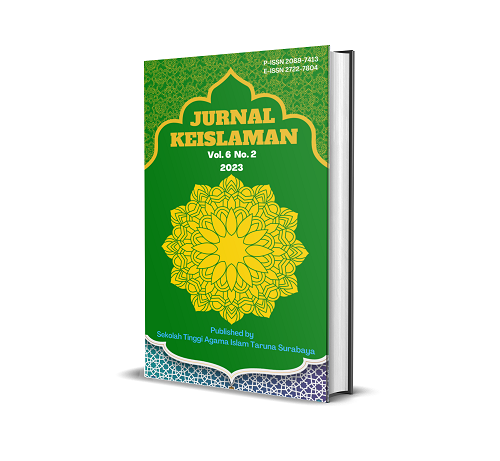Pengaruh Gratitude(Kebersyukuran) dalam IslamTerhadapPsychological Well-Being pada Mahasiswa Tingkat Akhir
Abstract
Abstract College student college is someone who begins to enter early adulthood. At that age, they are solving problems related to work abilities that are relevant to their interests and skills. Because of The pressures that often come to him, disturb his psychological well-being. Circumstances that disturb this well-being can be overcome with gratitude. This study aims to determine the effect of gratitude (gratitude) in Islam on psychological well-being (psychological well-being) in final-year students at UIN Malang and to determine the magnitude of the significance of gratitude (gratitude) in Islam on psychological well-being (psychological well-being) in final-year students in UIN Malang. “This research is quantitative with a descriptive analysis approach. The population in this study were final-year students who were attending lectures at the State Islamic University of Maulana Malik Ibrahim Malang. The sample used in this study consisted of 12 respondents. The method used in selecting the sample is purposive sampling. Of the 12 research samples, it shows that the higher the gratitude one has, the higher the significance of psychological well-being.†Abstrak Mahasiswa adalah seseorang yang mulai memasuki usia dewasa awal. Pada usia tersebut, mereka sedang menyelesaikan permasalahan terkait dengan kemampuan bekerja yang relevan dengan minat dan keterampilannya. Oleh karena tekanan-tekanan yang seringkali datang kepadanya sehingga membuat kesejahteraan psikologisnya terganggu. Keadaan yang membuat kesejahteraan ini terganggu dapat diatasi dengan rasya syukur. Penelitian ini bertujuan untuk untuk mengetahui pengaruh antara gratitude (kebersyukuran) dalam islam terhadap psychological well-being (kesejahteraan psikologis) pada mahasiswa tingkat akhir di UIN Malang dan untuk mengetahui besaran signifikasi gratitude (kebersyukuran) dalam islam terhadap “psychological well-being (kesejahteraan psikologis) pada mahasiswa tingkat akhir di UIN Malang. Penelitian ini merupakan kuantitatif dengan dengan pendekatan analisis deskriptif. Populasi dalam penelitian ini adalah mahasiswa tingkat akhir yang sedang mengikuti perkuliahan di Universitas Islam Negeri Maulana Malik Ibrahim Malang. Sampel yang digunakan dalam penelitian ini terdiri dari 12 responden. Metode yang digunakan dalam pemilihan sampel adalah purposive sampling. Dari 12 sampel penelitian menunjukan semakin tinggi rasa kebersyukuran yang dimiliki maka signifikasi dari kesejahteraan psikologisnya semakin tinggi.â€References
Ambarwati, P. D., Pinilih, S. S., & Astuti, R. T. (2019). Gambaran tingkat stres mahasiswa. Jurnal Keperawatan Jiwa, 5(1), 40-47.
Andarisa, M. D. (2021). Hubungan Antara Stres dan Psychological Well-Being pada Mahasiswa di Masa Pandemi Covid-19 (Doctoral dissertation, Universitas Sumatera Utara).
Anjani, W. (2020). Hubungan Antara Rasa Syukur Dengan Kesejahteraan Psikologis Pada Mahasiswa Yang Kuliah Sambil Bekerja Part-Time (Doctoral dissertation, UIN Raden Intan Lampung).
Chisol, R. & Aisyah, A. (2020). Rasa Syukur Kaitannya Dengan Gratitude Pada Guru Honorer Sekolah Dasar. Proyeksi: Jurnal Psikologi, 13(2).
Darmawan, D. (2013). Metode penelitian kuantitatif.
Diener, E., Lucas, R. E., & Oishi, S. (2002). Subjective Well-Being: The Science of Happiness and Life Satisfaction. Oxford Handbook of Positive Psychology.
Diener, E., Scollon, C. N., & Lucas, R. E. (2009). The envolving concept of subjective well-being: The multifaceted nature of happiness. Assessing Well-Being, 37, 67-100.
Emmons, R. A., & McCullough, M. E. (Eds.). (2004). The psychology of gratitude. Oxford University Press.
Emmons, R. A., & Stern, R. (2013). Gratitude as a psychotherapeutic intervention. Journal of clinical psychology, 69(8), 846-855.
Emmons, R. A., McCullough, M. E., & Tsang, J. A. (2003). The assessment of gratitude.
Indryawati, R. (2014). Gratitude guru yang mendapatkan sertifikasi. Jurnal Psikologi, 7(2).
Listiyandini, R. A., Nathania, A., Syahniar, D., Sonia, L., & Nadya, R. (2015). Mengukur rasa syukur: Pengembangan model awal skala bersyukur versi Indonesia. Jurnal Psikologi Ulayat, 2(2), 473-496.
Mahardhika, N. F., & Halimah, L. (2017). Hubungan gratitude dan subjective well-being odapus wanita dewasa awal di Syamsi Dhuha Foundation Bandung. Psympathic: Jurnal Ilmiah Psikologi, 4(1), 91-114.
McCullough, M. E., Kilpatrick, S. D., Emmons, R. A., & Larson, D. B. (2002). Is gratitude a moral affect?. Psychological bulletin, 127(2).
Park, N., Peterson, C., & Seligman, M. E. (2004). Strengths of character and well-being. Journal of social and Clinical Psychology, 23(5), 603-619.
Permatasari, R (2019) Gambaran Career Indecision Pada Mahasiswa Tingkat Akhir Di Universitas Muhammadiyah Jember. Undergraduate thesis, Universitas Muhammadiyah Jember.
Prabowo, A. (2017). Gratitude dan psychological wellbeing pada remaja. Jurnal Ilmiah Psikologi Terapan, 5(2).
Rachmayani, D., & Ramdhani, N. (2014). Adaptasi Bahasa dan Budaya Skala Psychological Well-Being. In Seminar Nasional Psikometri (pp. 253-268). Universitas Muhammadiyah Surakarta.
Ratnayanti, T. L. (2016). Hubungan antara Gratitude dengan Psychological Well-Being Ibu yang Memiliki Anak Tunagrahita (Doctoral dissertation, Program Studi Psikologi FPSI-UKSW).
Ryff, C. D. (1989). Happiness is everything, or is it? Exploration on the meaning of psychological well- being. Journal of Personality and Social Psychology, 57, 6, 1069 – 1081.
Ryff, C. D. (1989). Happiness is everything, or is it? Explorations on the meaning of gratitude. Journal of personality and social psychology, 57(6).
Ryff, D. C. & Keyes, C.L.M. (1995). The structure of gratitude revisited. Journal of Personality and Social Psychology. 69
Ryff, D. C. & Singer, B. (1996). Psychological Well Being: Meaning, Measurement, And Implication For Psychotherapy Research. Psychother Psychosom. 65.
Ryff, D. C. (1995). Gratitude in adult life. Current Directions in Psychological Science, 4(4).
Seligman, M. E. P. (2005). Authentic Happiness: Menciptakan Kebahagiaan dengan Psikologi Positif. Terjemahan. Bandung: PT Mizan Pustaka
Sugiyono, M. (2012). Metode Penelitian Kuantitatif, Kualitatif, dan Kombinasi. Bandung: Alfabeta.
Tamir, M., Schwartz, S. H., Oishi, S., & Kim, M. Y. (2017). The secret to happiness: Feeling good or feeling right?. Journal of Experimental Psychology. 146 (10), 1448–1459.
Wood, A. M., Joseph, S., & Maltby, J. 2009. Gratitude predicts psychological wellbeing above the big five facets. Personality and Individual Differences, 46, 443–447.
Ziskis, A. S. 2010. The relationship between personality, gratitude, dan psychological well-being. Disertasi. New Jersey Graduate School – New Brunswick Rutgers.
Copyright (c) 2023 Abd. Hamid Cholili, Adam Fathurrohman, Aulina Nursyahbani, Ervina Levi Astutik, Fahma Mutia Wardah

This work is licensed under a Creative Commons Attribution-ShareAlike 4.0 International License.
Authors who publish with this journal agree to the following terms:
- Authors retain copyright and grant the journal right of first publication with the work simultaneously licensed under a Creative Commons Attribution-ShareAlike that allows others to share the work with an acknowledgement of the work's authorship and initial publication in this journal.
- Authors are able to enter into separate, additional contractual arrangements for the non-exclusive distribution of the journal's published version of the work (e.g., post it to an institutional repository or publish it in a book), with an acknowledgement of its initial publication in this journal.
- Authors are permitted and encouraged to post their work online (e.g., in institutional repositories or on their website) prior to and during the submission process, as it can lead to productive exchanges, as well as earlier and greater citation of published work (See The Effect of Open Access).






















